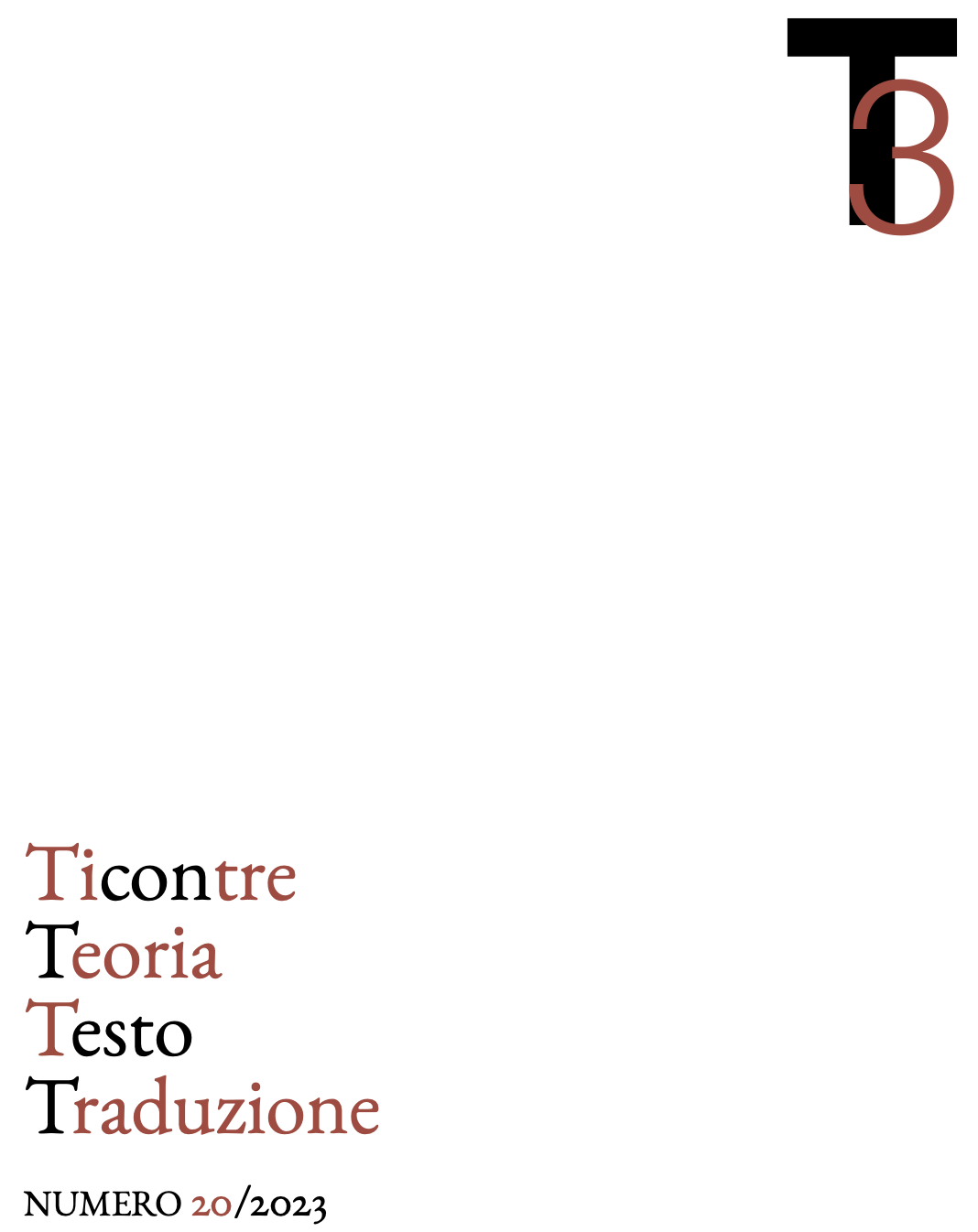«Dove sono io in quella corrente?» Strategie e forme dell'autorialità in M di Antonio Scurati
Keywords:
Antonio Scurati, M, Romanzo storico, Autore implicito, Onniscienza, AutorialitàAbstract
This paper offers a stylistic-narratological analysis of Antonio Scurati’s M. Il figlio del secolo (2018). Here, I will contend that there is no gap between the omniscient narrator who tells the rise of Mussolini and the real author of the text. The study will take into account the intrusive commentary made by the narrator, the presence of intertexts referring to other works written by Scurati and the formal architecture of the book, that foreshadows the transmedia extension of the narrative text. The intersection of these formal aspects triggers the reader’s emotive response, which leads to major effects in the reception of the text, especially in the light of the current political and historical context.
References
BACHTIN MICHAIL, Estetica e romanzo. Teoria e storia del discorso narrativo [1975], Torino, Einaudi 1979.
ID., L’autore e l’eroe. Teoria letteraria e scienze umane, Torino, Einaudi 1988.
BALLERIO STEFANO, Sul conto dell’autore. Narrazione, scrittura e idee di romanzo, Milano, Franco Angeli 2013.
BARENGHI MARIO, Antonio Scurati / M. Il figlio del secolo, Doppiozero, 19 novembre 2018, https://www.doppiozero.com/m-il-figlio-del-secolo (consultato il 9 marzo 2023).
BENJAMIN WALTER, Il narratore. Considerazioni sull’opera di Nikolaj Leskov [1936], Torino, Einaudi 2011.
BOOTH WAYNE C., The Rhetoric of Fiction, Chicago, University of Chicago Press 1983.
COHN DORRIT, Transparent Minds. Narrative Modes for Presenting Consciousness in Fiction, Princeton, Princeton University Press 1978.
CULLER JONATHAN, Omniscience, in «Narrative», XII, n. 1, 2004, pp. 22-34.
DAWSON PAUL, The Return of the Omniscient Narrator. Authorship and Authority in Twenty-First Century Fiction, Columbus, The Ohio State University Press 2013.
DONNARUMMA RAFFAELE, Ipermodernità. Dove va la narrativa contemporanea, Bologna, il Mulino 2014.
FISHER MARK, Spettri della mia vita. Scritti su depressione, hauntologia e futuri perduti [2013], Roma, minimum fax 2019.
GENETTE GÉRARD, Palinsesti. La letteratura al secondo grado [1982], Torino, Einaudi 1997.
ID., Fiction et diction, Paris, Seuil 1991.
GHIONI GLORIA, Scurati: «Questo romanzo su Mussolini è il mio massimo contributo all’antifascismo» (intervista con A. Scurati), 12 settembre 2018, www.illibraio.it/antonio-scurati-mussolini-877482/ (consultato il 9 marzo 2023).
GIGLIOLI DANIELE, L’autore è l’eroe. Di un carattere della più recente narrativa italiana, in «il Verri», n. 55, 2014, pp. 5-28.
GIOVANNETTI PAOLO, Spettatori del romanzo. Saggi per una narratologia del lettore, Milano, Ledizioni 2015.
ID., Ermafroditi, supereroi, picari mancati, in V. Spinazzola (a cura di), Tirature ’15. Gli intellettuali che fanno opinione, Milano, il Saggiatore 2015, pp. 73-79.
HAMBURGER KÄTE, La logica della letteratura [1957], trad. it. di E. Caramelli, Bologna, Pendragon 2015.
HERMAN DAVID, Introduction, in ID. (a cura di), The Emergence of Mind. Representations of Consciousness in Narrative Discourse in English, Lincoln-London, University of Nebraska Press 2011.
JAMESON FREDRIC, L’inconscio politico. Il testo narrativo come atto socialmente simbolico [1981], Milano, Garzanti 1990.
LANSER SUSAN S., The Narrative Act: Point of View in Prose Fiction, Princeton, Princeton University Press 1981.
MÄKELÄ MARIA, Navigating—Making Sense—Interpreting (The Reader behind «La Jalousie»), in M. LEHTIMÄKI, L. KARTTUNEN, M. MÄKELÄ (a cura di), Narrative, Interrupted. The Plotless, the Disturbing and the Trivial in Literature, Berlin-Boston, de Gruyter 2012, pp. 139-152.
PAVOLINI LORENZO, Antonio Scurati, M. Il figlio del secolo, in «L’Indice dei libri del mese», XXXV, n. 12, dicembre 2018.
PENNACCHIO FILIPPO, Eccessi d’autore. Retoriche della voce nel romanzo italiano di oggi, Milano, Mimesis 2020.
PHELAN JAMES, Somebody Telling Somebody Else. A Rhetorical Poetics of Narrative, Columbus, The Ohio State University Press 2017.
PROUST MARCEL, Contre Sainte-Beuve, Paris, Gallimard 1954.
ROYLE NICHOLAS, The Uncanny, New York, Routledge 2003.
SCARPELLINI EMANUELA, «M il figlio del secolo» di Antonio Scurati. Una polemica tra storia e narrativa, in «Memoria e Ricerca», n. 1, gennaio-aprile 2019, pp. 183-193.
SCURATI ANTONIO, Il rumore sordo della battaglia [2002], Milano, Bompiani 2006.
ID., La letteratura dell’inesperienza. Scrivere romanzi al tempo della televisione, Milano, Bompiani 2006.
ID., Una storia romantica, Milano, Bompiani 2007.
ID., Guerra. Narrazioni e culture nella tradizione occidentale, Roma, Donzelli 2007.
ID., Il tempo migliore della nostra vita, Milano, Bompiani 2015.
ID., Dal tragico all’osceno. Raccontare la morte nel XXI secolo, Milano, Bompiani 2016.
ID., M. Il figlio del secolo, Milano, Bompiani 2018.
SIMONETTI GIANLUIGI, La letteratura circostante. Narrativa e poesia nell’Italia contemporanea, Bologna, il Mulino 2018.
ID., Scurati, un Mussolini pieno di cliché, in «Il Sole 24 Ore», 4 marzo 2019, https://www.ilsole24ore.com/art/scurati-mussolini-pieno-cliche-AE0VJNdG (consultato il 9 marzo 2023).
STERNBERG MEIR, Expositional Modes and Temporal Ordering in Fiction, Bloomington, Indiana University Press 1978.
TIRINANZI DE MEDICI CARLO, Il vero e il convenzionale, Torino, UTET 2012.
ID., Il romanzo italiano contemporaneo. Dalla fine degli anni Settanta a oggi, Roma, Carocci 2018.
TURI GABRIELE, Il fascismo va al potere, giorno dopo giorno, in «Passato e presente», XXXVII, n. 106, 2019, pp. 180-185.
WALSH RICHARD, The Rhetoric of Fictionality. Narrative Theory and the Idea of Fiction, Columbus, The Ohio State University Press 2007.
Downloads
Published
How to Cite
Issue
Section
License
Copyright (c) 2023 Andrea Suverato

This work is licensed under a Creative Commons Attribution-NonCommercial-NoDerivatives 4.0 International License.




